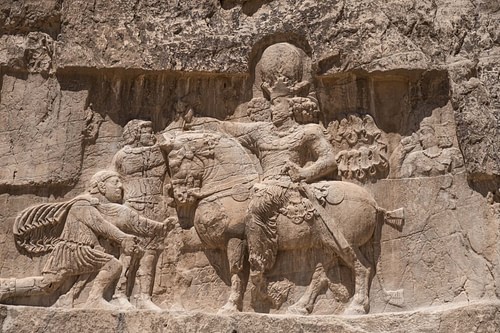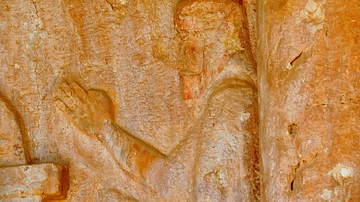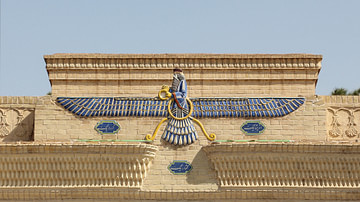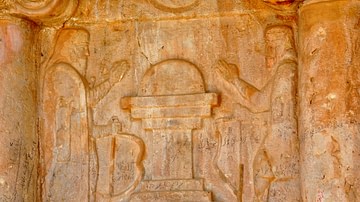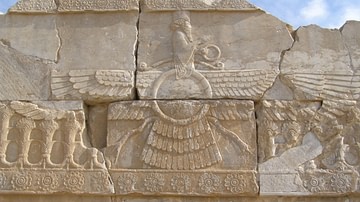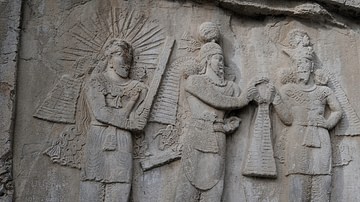
Zorvanism (also given as Zuvanism, Zurvanism) was a sect of the Persian religion Zoroastrianism which emerged in the late Achaemenid Empire (c. 550-330 BCE) and flourished during the Sassanian Empire (224-651 CE). It is often referenced as a Zoroastrian heresy because it departed significantly from two central Zoroastrian beliefs:
- That the Supreme Deity Ahura Mazda was the One Uncreated God
- That human beings had free will to choose between good and evil
Zorvanism claimed that Ahura Mazda (here known as Ormuzd, principle of good) was a created being, the twin brother of Angra Mainyu (known as Ahriman, principle of evil) and the Supreme Deity was Zorvan Akarana ("Infinite Time", also given as Zurvan and Zurvan Akarana). Time brought all things into being and caused them to pass away and, since time was implacable and human beings were helpless in resisting it, human existence was directed by fate, not free will.
After the Muslim Arab Invasion of Persia in the 7th century CE, Zoroastrianism was suppressed and Zorvanism all but disappeared. Its influence continued, however, in that the Zorvanite version of Zoroastrianism was the first to reach the West and so dictated how that religion was understood - as a dualist, instead of a monotheistic, faith – an interpretation which still affects how Zoroastrianism is understood in the present day. The concept of fate as more powerful than free will also influenced later Persian poets and the literary motifs which inform some of the greatest works of Persian literature and, through them, world culture.
Early Persian Religion
The early Persian religion was polytheistic with many gods under the Supreme King, Ahura Mazda (Lord of Wisdom) who had brought everything into being, including the younger gods. Ahura Mazda's enemy was Angra Mainyu, lord of the dark forces of evil and chaos whose sole purpose was to disrupt Ahura Mazda's order and thwart every one of his plans for the greater good.
The sky, earth, water, and fire had all been created by Ahura Mazda who also made vegetation, animals, and human beings and every attempt by Angra Mainyu to disrupt the universal good was transformed by Ahura Mazda to positive ends. When Ahura Mazda created the beautiful Primordial Bull, Gavaevodata, Angra Mainyu killed it; but Ahura Mazda brought the bull's corpse to the moon where it was purified and, from its purified seed, all animals were generated. When Angra Mainyu poisoned the minds of the first mortal couple – Mashya and Mashyanag – causing them to turn away from Ahura Mazda, their descendants were given purpose in life through the exercise of free will; they had the power to direct their own lives and choose good over evil and higher values over self-interest.
Zoroastrianism
At some point between c.1500-1000 BCE, a Persian priest named Zoroaster received a vision from a supernatural entity calling itself Vohu Manah (“good purpose”) who informed him the earlier understanding of the divine was wrong. Ahura Mazda was the sole, uncreated, god and there was no other. The divinities the people were worshipping were not gods but emanations of the single divine principle which was all-good and all-powerful and needed no “other gods” to assist it.

Zoroaster began preaching his new revelation and, unsurprisingly, met fierce resistance from the priests of the old religion who were living very comfortably from the sacrifices and donations of the people. Zoroaster was forced to flee his home, preaching wherever he went, until he came to the court of the king Vishtaspa. Here, he engaged the priests in a debate on the nature of Ultimate Truth and, though he is said to have won, Vishtaspa had him thrown into prison, allegedly after he was denounced as a sorcerer by the priests who had lost the debate.
While in prison, Zoroaster healed the king's favorite horse and Vishtaspa set him free and, soon after, converted. Vishtaspa's conversion opened the way for the wide-spread acceptance of Zoroaster's vision in his kingdom and so the new faith – known as Mazdayasna (“devotion to wisdom”) – was founded.
Zoroastrianism was based on five principles:
- The supreme god is Ahura Mazda
- Ahura Mazda is all-good
- His eternal opponent, Angra Mainyu, is all-evil
- Goodness is apparent through good thoughts, good words, and good deeds
- Each individual has free will to choose between good and evil
Adherents expressed these principles by:
- Telling the truth at all times
- Practicing charity
- Showing love for others
- Practicing moderation in all things
The purpose of human life was to take the side of Good against the forces of Evil and maintain order against chaos. Every human born was required to choose a side simply because that was the nature of human existence. Those who chose to follow Ahura Mazda would live full, productive, satisfying lives and be rewarded after death; those who followed Angra Mainyu would lead lives of confusion, strife, and petty self-interest and be punished in the afterlife.
The life after death was envisioned as comprising a bridge between the living and the dead (the Chinvat Bridge) which led to judgment by the angel Rashnu who sent the soul either on to paradise (the House of Song) or down to hell (the House of Lies). Neither destination was eternal, however, because a messiah would come – the Saoshyant (“One Who Brings Benefit”) – who would inaugurate the Frashokereti (End of Time). Afterwards, the old world would pass away, those in hell would be redeemed, Angra Mainyu would be destroyed, and all would be reunited in Ahura Mazda to live in eternal bliss.
This was the religion adopted by the Achaemenid Empire, most likely from the reign of Darius I (the Great, r. 522-486 BCE) onwards. The problem presented by Zoroaster's vision, however, was the origin of evil. If Ahura Mazda was all-good, and the source of all creation, where did Angra Mainyu and his legions of demons come from? How could an all-powerful, all-good, uncreated supreme being create evil when evil was, in no possible way, part of its nature?
This, of course, is the problem facing any monotheistic religion and scholars have pointed out that it is possible some answer was given by Zoroastrian theologians which was lost after the destruction of Zoroastrian libraries in the Muslim Arab Invasion of the 7th century CE. This is entirely possible but it seems as though, whatever answer may or may not have been given, people needed a resolution to this problem and this was supplied by Zorvanism.
Sources on Zorvanism
There is no known founder of Zorvanism and when it developed is unclear. There is a minor deity known as Zorvan (“Time”) in the Zoroastrian text Denkard, a collection of beliefs and customs, and it is thought this god was invoked during the latter part of the Achaemenid Empire in religious rituals. Zorvan does not seem to have been a particularly important god but perhaps was appealed to, or thanked, for the time in which the service (yasna) was held. How this minor god became the Supreme Deity of the Zorvanite movement is unknown.
The earliest mention of the sect in Western Literature comes from the Neo-Platonist philosopher Damascius (l. c. 458-c.538 CE) in his work Difficulties and Solutions of First Principles who references the earlier writer Eudemus of Rhodes (4th century BCE) as his source. Damascius was the head of Plato's Academy in Athens when the Byzantine Emperor Justinian I (r. 527-565 CE) closed the school along with all other pagan temples and institutions of higher learning and culture. Damascius fled Athens for the court of Kosrau I (r. 531-579 CE) of the Sassanian Empire.
Here he would have learned of Zorvanism first hand, since it was during this period that the movement was at its height, but he makes no mention of any direct knowledge of the sect and, instead, cites Eudemus of Rhodes. Zorvanism receives only the briefest mention as a “religion of the Medes” which claimed that Time had given birth to the twin gods of good and evil. Zorvan is featured more fully in the earlier Manichaean text Sabuhragan written by the religious visionary Mani (l. 216-274 CE, founder of Manichaeism) who was a guest of the Sassanian king Shapur I (r. 240-270 CE) and lived at his court.
In Mani's text, Zorvan is the Father of Greatness in the Realm of Light and the creative force in the universe. Manichaeism was influenced by Buddhism, Christianity, and Zoroastrianism as well as Gnostic teachings and Mani's own revelations. It seems clear that his understanding of Zoroastrianism was actually more Zorvanite and this suggests that Shapur I was himself a Zorvanite since he assisted Mani in developing and spreading his new faith.
This is entirely possible, as a number of ruling Sassanians appear to have been Zorvanites, but the Persian empires were well known for their religious tolerance and encouraging new faiths and Shapur I's efforts on Mani's behalf could simply be another example of this. Either way, Zorvanism was already developed by the time Mani came to Shapur I's court and it is clear he drew upon the central image of Zorvan/Time-as-Creator in developing his own religious belief system.
Zorvanism
The fact that Damascius alludes to Zorvanism in his Difficulties and Solutions of First Principles suggests how important an answer to the problem of the origin of evil was. Damascius' work attempts to define the nature of the Divine and Source of All Things and finally concludes that human beings simply cannot grasp the concept. The allusion to Zorvanism is a nod to an earlier attempt at explanation which Damascius seems to feel is inadequate. The mention of the belief in this work, however, suggests the problem was also addressed in other works, possibly Zoroastrian, now lost.
Zorvanism departs from Zoroastrianism initially in designating Zorvan the Supreme God. The androgynous Zorvan wishes for a son and prays, presumably to himself, making sacrifices for this to happen. His prayers and sacrifices go unanswered and he experiences a moment of doubt and, in this moment, Ahriman is conceived and, in the next – once he has regained his faith - Ormuzd is engendered. Zorvan proclaims he will give mastery of the world to whichever twin is born first but Ahriman, hearing this, cuts his way out of the primordial womb and so assumes the superior position. Zorvan corrects this by decreeing that Ahriman will only have dominion for a time (9,000 years) but Ormuzd will then assume control and have final victory.
Ormuzd is still the creator of the world and humanity but now Ahriman has control over this world and immediate influence over humanity. This dualism would influence the vision of Manichaeism in dividing human experience between the physical (evil and material) and spiritual (good and invisible). Justification for this faith seems to have been an oral tradition but sections of the Denkard, and commentary on those sections (the Zand) were used once the Avesta (Zoroastrian scriptures) were written down during the Sassanian Period.
Sects Within the Sect
Mainstream Zorvanites seem to have differed little from traditional Zoroastrians except that now Time was the Supreme Deity. This understanding encouraged the belief that human free will could not possibly count for much because no one, and nothing, could stand against time. This reasoning, in turn, produced three sects of Zorvanites within the system:
- Materialistic
- Fatalistic
- Mainstream
Materialists (Zandiks) believed there was no spiritual world at all – no gods, no demons, no House of Song and No House of Lies – because all had begun with Time. Since Time had no beginning and no end, neither did the world. Everything that existed had always existed and always would. Human beings were born, lived, and died and there was no reason to act one way rather than another because, eventually, one would die either way with no hope of reward.
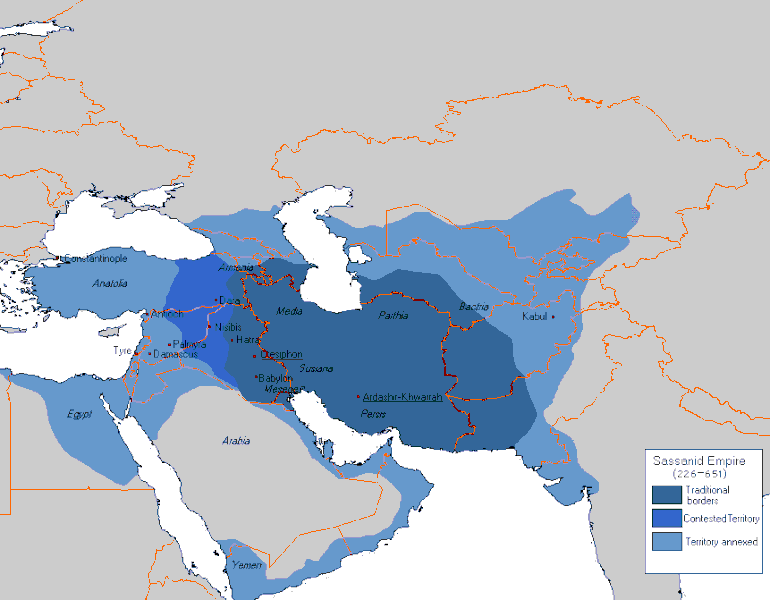
Fatalists believed that, since Time had created all things, Time was in control of all things. A person was born, lived, and died in accordance with Time – not by the will of a god – and one's story was already written at the time of one's birth. Ormuzd and Ahriman did exist but, in their war with each other, human free will was a casualty. The constellations – which directed one's path in life - were on the side of Ormuzd, while the planets – which influenced human thought, action, and fate - worked for Ahriman, so even if Ormuzd meant a person only the best, and arranged an auspicious birth, Ahriman's planetary influence would interfere and bring pain and disappointment. In this view, there was no room for human free will to accomplish anything.
Mainstream (so-called Proper) Zorvanites believed in the duality of the celestial twins and Time as their father (and so fate as superior to free will) but patterned their belief more closely on accepted Zoroastrianism. This view seems to have been the original Zorvanite vision which sought to answer the problem of the origin of evil. Scholar R.C. Zaehner explains how Zorvanite writers were able to deny the central tenet of Zoroastrianism of free will without contradicting the Zoroastrian vision or coming into conflict with Sassanian nobility who had made Zoroastrianism the state religion:
Their resolution of the dilemma was ingenious, if disingenuous. It so happens that the Avestan word eresh occurs in [a stanza of the Denkard] and though they knew that this word meant 'rightly' and usually so translate it, they preferred on this occasion to feign ignorance and translated it with the Pahlavi word arish, which is one of the names of the demon of envy; and so it was possible for the author of the Denkard to represent the offensive doctrine as being the invention of the demons! The whole thing is passed off as being 'a proclamation of the Demon of Envy to mankind that Ohrmazd and Ahriman were two brothers in one womb'. So was the Zovanite heresy dismissed as being the invention of devilry. (6)
Even so, this vision could be accepted because the stanza of the Denkard Zaehner is referencing is a commentary on a part of the Avesta (Yasna 30.3) in which Zoroaster himself alludes to twin deities, one Good and the other Evil, without developing the concept. If questioned, a Zorvanite could claim that Zoroaster could have meant that this reference to the twin deities was the true vision or say he could have been referencing a delusion cast by dark forces, without necessarily denying the value of free will outright.
One could still exercise one's ability to choose, even if the end results were already decided. A modern illustration of this would be a person's decision to smoke cigarettes. One can choose to smoke or not smoke – this is within human power – but one is going to eventually die no matter the choice – that is outside human power. Even so, by choosing to not smoke, one will, statistically, live a healthier, and longer, life. In the interests of resolving the origin of evil, then, dualism was expounded by the mainstream Zorvanites even though the supremacy of Time denied the final efficacy of free will.
Conclusion
This version of Zoroastrianism served to introduce the faith to the rest of the world and this is why, to this day, scholars continue to debate whether Zoroastrianism was the first widely accepted monotheistic faith or a dualist religion. The dualism of Zorvanism, as noted, would influence Manichaeism which would then affect the later development of other belief systems, such as the Cathars of Southern France during the Middle Ages, and so became well-known in the West. Further, Muslim scholars and historians also popularized this version of the older faith in their works and Christian theologians would do the same.
The fatalism of Zorvanism would also influence later Persian writers. One example of this is the great Persian astronomer, mathematician and poet, Omar Khayyam (l. 1048-1131 CE), who is best known for his famous Rubaiyat. Khayyam's work has a number of stanzas on fate and destiny but the best known is 51:
The Moving Finger writes and, having writ,
Moves on; nor all your piety nor wit
Shall call it back to cancel half a line,
Nor all your tears wash out a word of it.
Time – here imagined as a moving finger – dictates all of human experience and there is nothing the individual can do about that. One must accept that one's ultimate fate is in the hands of Time, not one's own, and free will is simply an illusion.
The later poet Jahan Malek Khatun (l. 1324-1382 CE), a princess of the Inju Dynasty in Shiraz who wrote in Persian, makes a similar observation in her poetry. In one of her many untitled works, she writes:
The roses have all gone; “Good-bye,” we say; we must;
And I shall leave the busy world one day; I must.
My little room, my books, my love, my sips of wine,
All these are dear to me, they'll pass away; they must.
(Davis, 41)
Khayyam's and Khatun's sentiments here reflect a specifically Zorvanite view, even though neither were Zorvanites and even if they themselves were unaware of the origin of that view, and its effects were far-reaching. The literary conceit of time as a thief, used by writers for centuries, was not invented by the Persians – it appears in Egyptian literature of the Middle Kingdom (2040-1782 BCE) and elsewhere earlier – but it was developed by Persian artists influenced by Zorvanite theology whose works were available to a wide audience long before Egyptian and Mesopotamian language systems were deciphered in the 19th century CE.
Further, the Manichaeism which Zorvanism influenced would become one of the most popular religions of the ancient world, rivalling Christianity, and would influence aspects of that faith as well as the many heresies it fought to suppress. Even in the modern day, when few people have ever even heard of Zorvanism, the concept of time directing destiny is a familiar concept and the debate on the supremacy of free will over determinism continues in academic settings, popular literature, and media. Zorvanism itself may have vanished after the 7th century CE but its influence continues to be felt.
